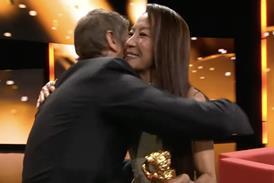
The Berlin International Film Festival faced up to several ongoing political controversies in a speech-heavy opening ceremony for the 74th edition tonight (February 15).
Following controversy around the invitation then disinvitation of AfD policitians to the ceremony; plus the crisis in Gaza; and ongoing Russian invasion of Ukraine, hosts Hadnet Tesfai and Jo Schuck confronted the political aspect of the festival in their opening remarks.
“Saying ‘this is how we did it in the last 200 years’ is not enough,” said Schuck, in a possible reference to criticism of the festival for inviting AfD politicians due to it being protocol in previous years.
Mariette Rissenbeek, in her final edition as managing director of the festival, read a statement about the Berlinale’s political responsibilities and outlook.
Starting with the siege on Gaza by Israeli forces following the Hamas attacks of October 7, Rissenbeek said, “We call on everyone to do everything possible to protect the lives of civilians.
“The wars and conflicts in Ukraine, Iran, Sudan, as well as the consequences of the earthquake in Turkey, continue to accompany us.
“That is why we must and can adapt the rules for dealing with one another,” she added, in another potential reference to the invitation about-turn.
Rissenbeek dealt with the AfD – a right-wing party that has held discussions about deporting migrants from Germany – in saying “a party that legitimises its anti-democratic and discriminatory attitude by saying that, ‘We are allowed to do that because we are democratically elected’ forgets that it is a great privilege to take part in a democratic election and at the same time has the duty to adhere to all the rules of democracy and to follow them, respect and protect them.”
The festival stands for “supporting and enriching society with all the people who need our protection now, especially with the many people who have been taking to the streets for democracy for weeks,” added Rissenbeek. “With it we can change the world, understand better and tolerate it better.”
“The first article of the Universal Declaration of Human Rights, it can guide us through this 74th Berlinale.” (Article 1 of the said declaration begins: “All human beings are born free and equal in dignity and rights.”)
Crises, conflicts
Speaking at her third Berlinale as German federal government commissioner for culture and media, Claudia Roth gave an impassioned speech along similar lines.
“We live in a time that threatens to overwhelm us with its crises, its conflicts, its misery and its tragedy,” said Roth, citing the Ukraine conflict that began just after the first festival under her time in post.
Roth reiterated solidarity with Iranian women, citing filmmakers Maryam Moghaddam and Behtash Saneeha, who are unable to leave Iran to attend the world premiere of their competition title My Favourite Cake tomorrow (Friday 15).
The politician also spoke passionately about the Hamas attacks on Israeli citizens of October 7, calling it “a day of destruction, a day of hundreds of rapes and hostage-takings, a horror that still continues.” Switching to English for the only time in her speech, she shouted, “Bring them home, now!” – referring to the Israeli hostages still held captive in Gaza.
Roth, a member of centre-left German party Alliance 90/The Greens, also had short shrift for the AfD, saying, “Our democracy is not immune, it is threatened by its enemies, they are the enemies of the open society. They meet in villas where they plan space and deportations based on ethnic sentiments.
“They want to decompose and destroy this republic, our liberal democracy, and use ugliness for their racism and hatred. We embrace diversity. Let’s put respect and courage, let’s put friends and understanding, let’s put empathy and humanity.”
Jurors
The political commentary continued when the competition jurors were finally brought to the stage as part of the 70-minute ceremony.
Jury president Lupita Nyong’o answered a question from Schuck about stepping into her role by noting she is the first Black person to hold the position in the 74 editions of the festival.
“I’m more than my race,” said Nyong’o. “I am also very proud, humbled and honoured to break that barrier and in a time right now, when there’s so much divisiveness, with progression comes regression and resorting to tribalism – I’m really proud to be a symbol of progress.”
Having deftly managed a tense moment at this morning’s jury press conference with fellow juror Albert Serra over his “fascination” with Vladimir Putin, Ukrainian writer Oksana Zabuzhko recounted the duality of attending the jury photocall at the exact moment she received notification of the latest Russian missile attack on her country.
A friend notified her a bomb had landed 900 metres from his house just as she had to immediately face the wall of photographers calling for poses. “That was an interesting experience,” said Zabuzhko.
Although heavy on talking, the ceremony passed largely without incident; which will be a relief to the festival organisers. Hosts Schuck and in particular Tesfaye were on jolly form, with the latter strolling around the auditorium and engaging in light-hearted jokes with Cillian Murphy and Matt Damon, lead actor and producer of Tim Mielants’ opening night film Small Things Like These.
Luminaries from across German society were in attendance, from actors including Christian Friedel (co-lead in Oscar-nominated The Zone Of Interest); to actor-filmmaker Aylin Tezel; to retired German football star Philipp Lahm, who took to the stage to discuss the Berlinale Meets Football cultural programme he has worked on, ahead of the UEFA Euro 2024 tournament, of which he is tournament director.
Little mention was made of Rissenbeek and artistic director Carlo Chatrian’s departure after the 74th edition. Their successor, former BFI London Film Festival director Tricia Tuttle, was in attendance, chatting with Luxembourgish-German star Vicky Krieps prior to the ceremony.
The evening began with a procession of around 70 actors and directors on the red carpet, who walked hand-in-hand in silence before gathering in front of the Berlinale Palast to chant ”Defend democracy.”

























No comments yet